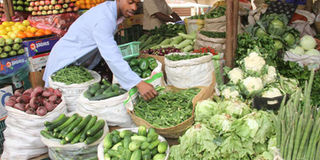State banks on farmers in plan to boost nutrition

A vendor arranges vegetables in a stall for sale. Farmers have been urged to produce more nutritious foods. FILE | NMG
What you need to know:
- The Agriculture ministry said it is working on a plan to revive the home economics extension programme.
- The two-day meeting facilitated by USAID and organised by the Agriculture ministry discussed issues touching on the negative impact of malnutrition and food security.
- Dr Cleopas Mailu, the Health CS, told the meeting that Kenya was one of 88 countries in the world experiencing the double burden of malnutrition that includes undernutrition and excessive weight.
Farmers have been asked to produce food that is nutritious as the government seeks to improve nutrition, especially among children, across the country.
The Agriculture ministry said it is working on a plan to revive the home economics extension programme, but this will only succeed if farmers produce quality food.
The initiative would involve training women on food and nutrition, home management, maternal and child health, family life education, health and sanitation, among others.
“This is an initiative that needs key actors to succeed and part of the funds will be from development partners. We are also encouraging growers to focus on nutrition-sensitive agriculture,” said Agriculture secretary Anne Onyango during the National Agri-nutrition Conference in Nairobi this week
The two-day meeting facilitated by USAID and organised by the Agriculture ministry discussed issues touching on the negative impact of malnutrition and food security.
USAID Regional Mission Director Tina Dooley-Jones emphasised on the need to ensure agriculture projects include a nutrition element.
Onyango, who read Agriculture CS Willy Bett’s speech, said there are a number of projects in the ministry that have a bearing on nutrition.
Dr Cleopas Mailu, the Health CS, told the meeting that Kenya was one of 88 countries in the world experiencing the double burden of malnutrition that includes undernutrition and excessive weight.
He identified low agricultural productivity, frequent droughts, lack of knowledge on good nutrition practices, poor natural resource management, dysfunctional markets and overdependence on rain-fed agriculture as causes of food and nutrition insecurity.





